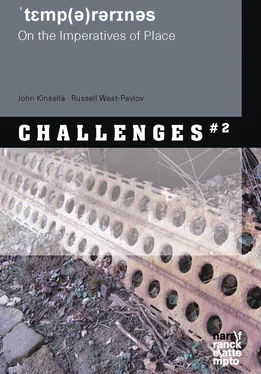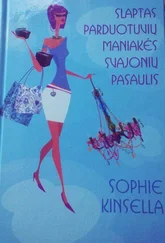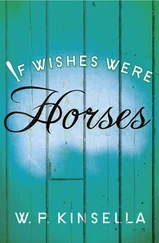My response, taking into consideration the vagaries of translation-loss and recontextualising to my own ecology of poetics (maybe the only ‘eco’ that poetry can ‘possess’!):
Space does not need to be filled—all space is already filled, or filling and emptying or in a state of ‘about to be filled’. Not just symbolic ‘dark matter’, but an eternally active spatiality, a flux of movement and exchange in which privilege is local and immediate but never permanent. I step and my steps leave a mark—I step again and the mark gets deeper but doesn’t erase the first step. But it is at once physically and conceptually eroded and its initial presence needs be restated (in poetry, in art, in music) to ensure respect for its initial presence, for knowledge of its intrinsic worth. In the same way, the poem text lost and present, or word-of-mouth, suffers entropy and is remade—it is flux. How can we respect indigenous space and open that space to people in need of a place? How can we entertain and respect multiple arguments for presence? How can we all be and not take away from each other? Space does not need to be filled: it is not a vacuum to be fed. It is a presence. But a presence that can tolerate mutual ‘occupation’.
Environment as the presence of all matter—living and ‘enlivening’ as it exists without the consequences of colonisation (theft). It is through the active notion of occupying space because it is ‘there to be occupied’ that invasive mentality gains traction—the poem should resist this as much as we should in our living actions. Instead of ‘left’ and ‘right’, maybe we should think in terms of how people wish to ‘control’ or ‘respect’ this ecology of space. Liberty of space or control of space .
Lefebvre is wrong in his deployment and understanding of constructs of (natural) environment. When he absurdly writes, ‘Pollution has always existed...’ (ibid: 326) he seems to treat it more as metaphor than reality. There is nothing ordinary about waste. Understanding the waste we produce—from the house, the town, the city, or a camp, or a tent or in the open—is pivotal to understanding the weight of being human, of a consciousness of occupying space to the exclusion of other living entities. Pollution as metaphor is the convenience of being able to pollute in reality and to pollute reality. This is the kind of crap that has allowed anti-green Marxists to (re)negotiate human space and biosphere as ALL, to negate intactness of ‘environment’. They are the colonisers who work hand-in-hand with the capitalist destroyers. [...]
20/3/2016 Tübingen
Walked through forest to the Wurmlinger chapel in its island hill with Tracy and Tim. A nice 16km round trip—not far, but a good walk. Enjoyed ourselves greatly. Thinking of chapel-in-the-forest poems—Uhland’s poem is on the outside wall. His poem of burial and song and life and loss. And I think of Michael Dransfield’s poem ‘Geography’ and those exquisite lines which have imprinted me since I was a teenager:
in the forest, in unexplored
valleys of the sky, are chapels of pure
vision. there even the desolation of space cannot
sorrow you or imprison. i dream of the lucidity of the vacuum,
orders of saints consisting of parts of a rainbow,
identities of wild things
JK
Selecting a Poem for Poetry Daily , 2015
On Receiving From England a Bunch of Dried Wild Flowers.
Pale Ghosts! of fragrant things that grew among
The woods and valleys of my native land,
Phantoms of flowers I played with long ago:
Here are the scented violets I sought
In their cool nooks of verdure, and the bells
That fringed the mountain crag with loveliest blue;
Here are the flushing clusters of the May,
The dainty primrose on its slender stem;
And the forget-me-not—all faint and pale
As those dim memories of home that haunt
The exile’s wistful heart in banishment.
I look around and see
A thousand gayer tints; the wilderness
Is bright with gorgeous rainbow colouring
Of flowers that have no dear familiar names.
I see them closing ere the dews of night
Have touched their waxen leaflets: close they fold
Their tender blossoms through the darkened hours,
And will not open, though the fractious winds
Should wrestle with their roots and strain their stems.
They waken not until the softer airs,
Breathed from the rosy lips of early morn,
Come whispering, “lo! the lordly sun is nigh.”
But in my hand these frail memorials
Lie closely pressed; a slight electric link,
By which thought over-passes time and space,
To other hands that plucked them: other hands
That never more to any touch of mine
Shall thrill responsive. Blessed be those hands
With prosperous labours, fruitful through long years,
Of all life’s truest, tenderest charities.
E.
Western Australia, 15th September, 1868.
‘I look around and see’. There’s a wilful effort in this, a forcing of the self beyond the casual formulaic, the poetic gesture to keep the poem flowing. A narrative device, sure, but also an acceptance of a different embodiment in place. That in the poem, and in the poet, many stories of belonging and exclusion crisscross, and try to coalesce. In the neatness of the poem, we might be led to believe that prosody’s ultimate purpose is to package these contradictions. Certainly the poet wants to write ‘verse’, but it’s only to contain the rough edges and disruptions of writing in a space that challenges and contradicts colonial manners, the imposition of the ‘civilised’ on day-to-day life. What makes this poem different is where and when it was written. And why.
Just over thirty years after this poem was written, we read ‘Willy Willy: The Boulder Bard’ in his ‘Ode to Westralia’, noting of Western Australia (pre Federation):
Land of Forests, fleas and flies,
Blighted hopes and blighted eyes,
Art thou hell in earth’s disguise,
Westralia?
Art thou some volcanic blast
By volcanoes spurned, outcast?
Art unfinished—made the last
Westralia?
Wert thou once the chosen land
Where Adam broke God’s one command?
That He in wrath changed thee to sand,
Westralia!
Land of politicians silly,
Home of wind and willy-willy,
Land of blanket, tent and billy,
Westralia.
Home of brokers, bummers, clerks,
Nest of sharpers, mining sharks,
Dried up lakes and desert parks,
Westralia!
Land of humpies, brothels, inns,
Old bag huts and empty tins,
Land of blackest, grievous sins
Westralia.
The sense of Western Australia (massive as it is), being the ‘end of the earth’, and in this something perversely to be celebrated, was a dominant tone in verse written out of the colony.
In terms of the brutalities settlers committed on the indigenous peoples of the region, most of the newspaper verse found in early colonial papers is overtly racist, often hate-filled. Moral defence as attack? But one did find a register of guilt even if it was rendered in the ‘noble savage’ sense with touches of ‘local colour’ (this is an American term, not an Australian one regarding context and period, but the irony serves the bereftness of the situation). The poet ‘Acaster’ in ‘O’er a Native’s Grave’ (1871), writes, contesting the given bigotries of the colonial press and community:
Poor child of earth—The rising sun,
That tips the hills with mellow ray,
No more shal’t rouse thee from thy sleep,
Or cheer thee on thy lonely way.
No more with spear, and weapons rude,
Читать дальше












